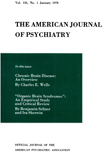Implications of increased dosage of neuroleptic medications during psychotherapy
Abstract
Unrecognized emotional reactions on the part of the psychiatric trainee may result in the inappropriate use of medications. To illustrate the possibility that increases in medication dosages may be related to the psychiatric clinician's lack of control, the authors present three clinical examples and discuss the concept of countertransference. A model of supervision is described in which the supervisor, trainee, and patient meet to correct these therapeutic distortions and reduce the amount of medication required.
Access content
To read the fulltext, please use one of the options below to sign in or purchase access.- Personal login
- Institutional Login
- Sign in via OpenAthens
- Register for access
-
Please login/register if you wish to pair your device and check access availability.
Not a subscriber?
PsychiatryOnline subscription options offer access to the DSM-5 library, books, journals, CME, and patient resources. This all-in-one virtual library provides psychiatrists and mental health professionals with key resources for diagnosis, treatment, research, and professional development.
Need more help? PsychiatryOnline Customer Service may be reached by emailing [email protected] or by calling 800-368-5777 (in the U.S.) or 703-907-7322 (outside the U.S.).



